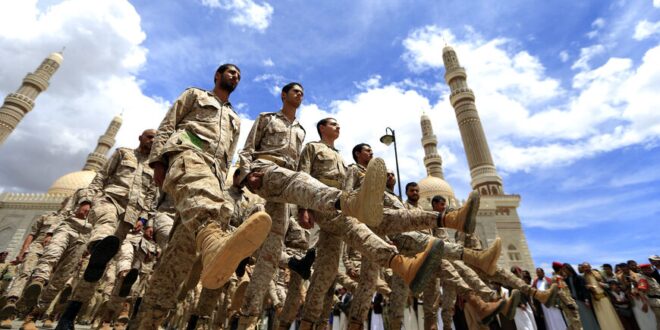US Special Envoy for Yemen Tim Lenderking called on the Iran-backed rebels to “seize this unprecedented opportunity” to sit down with the Yemeni government.
The United States on Wednesday urged Yemen’s Houthi rebels to negotiate with the country’s Saudi-backed government to resolve the near-decade-long civil war.
US Special Envoy for Yemen Tim Lenderking said he is optimistic about prospects for progress in Yemen, where an informal truce between the warring parties has largely held despite its expiration after six months in October 2022. The period of relative calm has created additional negotiating space to end to the bloodshed, now in its ninth year.
Yemen has been mired in conflict since the Houthis expelled the internationally recognized government in 2014, and seized the capital, Sanaa, along with much of the country’s north. In 2015, Saudi Arabia led a military coalition including the United Arab Emirates that intervened to restore the exiled government led by Yemen’s President Abed Rabbo Mansour Hadi.
The fighting that ensued has killed hundreds of thousands of people (either directly or through malnutrition and disease), brought Yemen to the brink of famine and created what the United Nations calls the world’s worst humanitarian crisis.
Riyadh has sought to exit the costly war that’s strained its relationship with Washington. In April, it sent a delegation led by the kingdom’s ambassador to Yemen to meet with Houthi leadership in Sanaa, raising hopes the two sides could negotiate an end to the conflict.
But analysts have said ending Yemen’s multifaceted war — not just Saudi Arabia’s involvement in it — will ultimately require peace talks among the various Yemeni factions, including the eight-member Presidential Leadership Council (PLC), which replaced Hadi after he stepped down under Saudi pressure last year.
Lenderking, who recently returned from a trip to the region, said a durable settlement must “address the concerns of a wide range of Yemenis.”
“We and others in the international community are urging the Houthis to seize this unprecedented opportunity to sit down with the Republic of Yemen Government to chart a brighter future for Yemen,” Lenderking said in a phone briefing with reporters.
The Houthis have refused to talk with the PLC or Yemeni cabinet, deeming them “mercenaries” of Saudi Arabia, said Abdulghani Al-Iryani, senior researcher at the Sana’a Center for Strategic Studies think tank.
For its part, the Saudi-backed government has demanded the Houthis lay down their arms as a prerequisite for negotiations, Al-Iryani said.
“In the same way that the Houthis have not articulated a path towards peace that is meaningful, the government is doing the same,” he said. “Both sides want to achieve total victory as a prerequisite for negotiations.”
The Omani-facilitated talks between the Houthis and Saudis have failed to produce a breakthrough, which observers attributed partly to the rebels’ demand that government oil and gas revenues be used to pay public salaries in their territory. Also setting back the talks is Riyadh’s insistence that the Houthis treat it as a mediator to the Yemeni war, not a party to it, the sources said.
“You have three parties to the conflict that are not presenting anything that could be a real starting position,” Al-Iryani said.
The humanitarian situation in the Arab world’s poorest country remains dire. More than 21 million people — some two-thirds of Yemen’s population — require humanitarian assistance to survive, according to the UN. At the same time, the World Food Program has warned funding gaps may force the UN agency to scale back its food assistance to Yemenis in the coming months.
The de facto truce has succeeded in halting the bloodshed but done little to improve the humanitarian situation, said Abdulwasea Mohammed, the Oxfam charity’s advocacy, media and campaigns manager for Yemen.
“Yemenis are now more concerned than ever that the parties are only interested in their own games,” said Mohammed. “People fear that without securing peace, there is a big possibility that they will resume fighting and conditions will worsen.”
 Eurasia Press & News
Eurasia Press & News



